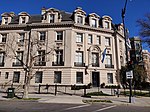The Leiter House was a large mansion that once stood at 1500 New Hampshire Avenue NW in the Dupont Circle neighborhood of Washington, D.C. Completed in 1893 for wealthy businessman Levi Leiter, the palatial 55-room neoclassical residence was designed by architect Theophilus P. Chandler Jr., whose notable works include Trinity Episcopal Church, the Stirling mansion, St. Thomas Episcopal Church, and the North Philadelphia station. The house was one of several mansions that were built in the late 19th and early 20th centuries around the perimeter of Dupont Circle, a traffic circle and park that was considered a fashionable area at the time.
Leiter had made his fortune in real estate ventures after cofounding what would later become the Marshall Field & Company department store chain. He and his wife, Mary, wanted to be involved in social circles in the nation's capital and relocated with their children to Washington, D.C. in 1883. They spent the first decade in the city renting another large Dupont Circle house, the James G. Blaine Mansion, before moving into their finished home in 1893. Throughout their time in the city, the Leiters entertained at their residences, hosted foreign dignitaries and members of local society, and hosted a wedding breakfast and reception for their daughter, Mary, to George Curzon, 1st Marquess Curzon of Kedleston. Following Leiter's death in 1904, his wife continued occupying the house for several years, hosting the weddings of their other daughters, including Margaret to Henry Howard, 19th Earl of Suffolk. Mary gifted the house to her son, Joseph, and daughter-in-law on their wedding day in 1908. Joseph and his wife continued the tradition of hosting social events in the house for the next few decades. The couple allowed the Italian government to use their house during World War I and the Soviet government briefly rented the house for use as diplomatic offices in the 1930s.
During World War II the US government rented the house as office space for the National Advisory Committee for Aeronautics. It was during this time that Joseph's son, Thomas, sold the house to a local architect and real estate developer. Two years after the war, the building was demolished after being stripped of valuable building materials. It was replaced with the Hotel Dupont Plaza, now known as The Dupont Circle Hotel. The only remaining large residences that once lined Dupont Circle are the Blaine Mansion, Patterson Mansion, and Wadsworth House, home of the Sulgrave Club.










